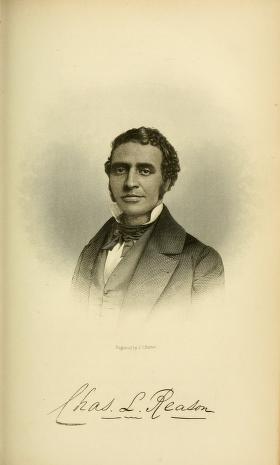Working for Higher Education: Advancing Black Women’s Rights in the 1850s
Charles Lewis Reason
Charles Lewis Reason, born to Haitian immigrants in 1818, was raised to understand the importance of education. He set the stage for Black excellence through education while serving on the Committee on Manual Labor School. As a political activist, he played a large role in the Colored Conventions movement as he worked with countless other Black and white abolitionists who were compelled by their belief that Blacks’ entry into society and out of the evils of slavery was through education. Reason believed that the combination of a liberal education and manual labor education would benefit Blacks the most.[1]
Reason demonstrated deep intelligence in mathematics as a child. Reason began his teaching career at the age of fourteen, first as a teacher in New York City high schools, and later as a professor of literature and language at Central College in McGrawville, New York.[2] In 1847, Reason and Charles B. Ray founded the Society for the Promotion of Education among Colored Children, a Black organization authorized by the state legislature to oversee Black schools in New York City.
Reason wrote the introduction for Autographs for Freedom (1854). In it, he advocates for the establishment of an industrial college for Blacks (read here). Reason’s commitment to Black education would echo 170 years later. On February 8, 2016, hundreds of Black professionals lined a Seattle public school’s walkway, hoping to dispel negative stereotypes of Black men by showing students examples of successful Black politicians, police officers, and professors. Dressed in their work attire, these men demonstrated the importance of portraying Black men in a positive light.[3] This action has strengthened and continued the necessary dialogue surrounding the continual success of Black individuals, an ideology Reason valued, while expelling the negative stereotypes that plague Blacks.
References
[1] Frederick Douglass, ed., “Report of the Committee on Manual Labor,” Frederick Douglass Paper (Rochester, NY), August 5, 1853. Accessed March 27, 2016. Accessible Archives.
[2] “Black Founders: The Free Black Community in the Early Republic.” Library Company of Philadelphia.
[3] Paige Cornwell, “Hundreds of Black Men Turn out to Encourage Students, Dispel Stereotypes,” The Seattle Times, February 8, 2016. Accessed February 20, 2016.
Credits
Written by Gabriel Barrett-Jackson. Taught by Sharla Fett, History 213, Occidental College, Spring 2016.
Edited and revised by Samantha de Vera, University of Delaware.

